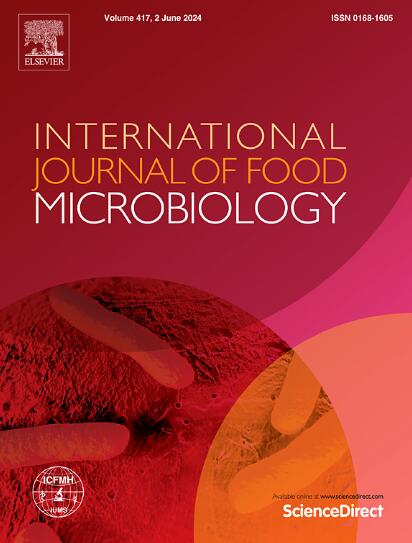Temperature-mediated shift from competitive to facilitative interactions between lactic acid bacteria and bacillus species in daqu fermentation: Insights from metagenomics, dual RNA-seq, and coculture analysis
IF 5
1区 农林科学
Q1 FOOD SCIENCE & TECHNOLOGY
International journal of food microbiology
Pub Date : 2025-07-19
DOI:10.1016/j.ijfoodmicro.2025.111352
引用次数: 0
Abstract
Daqu, a pivotal starter that defines the flavor profile and quality of Baijiu, undergoes dynamic temperature changes during its production, significantly influencing the microbial community structure and function. Although the importance of fermentation temperature in shaping microbial biodiversity is well-recognized, its impact on microbial interaction dynamics and the underlying mechanisms remains poorly understood. This study integrates metagenomics, dual RNA-seq, and coculture experiments to elucidate temperature-dependent microbial interactions during Daqu fermentation. Metagenomic analysis revealed that lactic acid bacteria (LAB) and Bacillus are dominant genera with distinct thermal preferences that nevertheless coexist throughout the fermentation process. Elevated temperature stress was found to enhance positive microbial interactions within the Daqu ecosystem. Dual RNA-seq analysis uncovered temperature-responsive gene expression patterns associated with oxidative stress, metabolic capacity, and environmental information processing in representative LAB and Bacillus strains. Guided by these multi-omics findings, co-culture assays demonstrated a temperature-dependent shift in microbial interaction modes. At 30 °C, Lactococcus lactis secretes lactic acid that inhibits the growth of Bacillus subtilis, whereas at 50 °C, B. subtilis alleviates oxidative stress in L. lactis by producing cobalamin, thereby enabling short-term rescue and sustained coexistence over serial transfers. These findings provide critical insights into the temperature-driven modulation of microbial interactions, enhancing the precision and manageability of the Daqu fermentation process.
在大曲发酵中,乳酸菌和芽孢杆菌之间的相互作用从竞争到促进的温度介导转变:来自宏基因组学、双rna测序和共培养分析的见解
大曲是决定白酒风味和品质的关键发酵剂,在白酒生产过程中,温度会发生动态变化,对微生物群落结构和功能产生重大影响。虽然发酵温度对微生物生物多样性的影响已被广泛认识,但其对微生物相互作用动力学的影响及其潜在机制仍知之甚少。本研究整合了宏基因组学、双rna测序和共培养实验来阐明大曲发酵过程中温度依赖性微生物相互作用。宏基因组分析表明,乳酸菌和芽孢杆菌是优势属,具有不同的热偏好,但在整个发酵过程中共存。高温胁迫可增强大曲生态系统内微生物的良性相互作用。双RNA-seq分析揭示了具有代表性的LAB和芽孢杆菌菌株中与氧化应激、代谢能力和环境信息处理相关的温度响应基因表达模式。在这些多组学研究结果的指导下,共培养分析显示了微生物相互作用模式的温度依赖性转变。在30°C时,乳酸乳球菌分泌的乳酸抑制枯草芽孢杆菌的生长,而在50°C时,枯草芽孢杆菌通过产生钴胺素来缓解乳酸乳杆菌的氧化应激,从而在一系列转移中实现短期拯救和持续共存。这些发现为微生物相互作用的温度驱动调节提供了重要的见解,提高了大曲发酵过程的精度和可管理性。
本文章由计算机程序翻译,如有差异,请以英文原文为准。
求助全文
约1分钟内获得全文
求助全文
来源期刊
CiteScore
10.40
自引率
5.60%
发文量
322
审稿时长
65 days
期刊介绍:
The International Journal of Food Microbiology publishes papers dealing with all aspects of food microbiology. Articles must present information that is novel, has high impact and interest, and is of high scientific quality. They should provide scientific or technological advancement in the specific field of interest of the journal and enhance its strong international reputation. Preliminary or confirmatory results as well as contributions not strictly related to food microbiology will not be considered for publication.

 求助内容:
求助内容: 应助结果提醒方式:
应助结果提醒方式:


